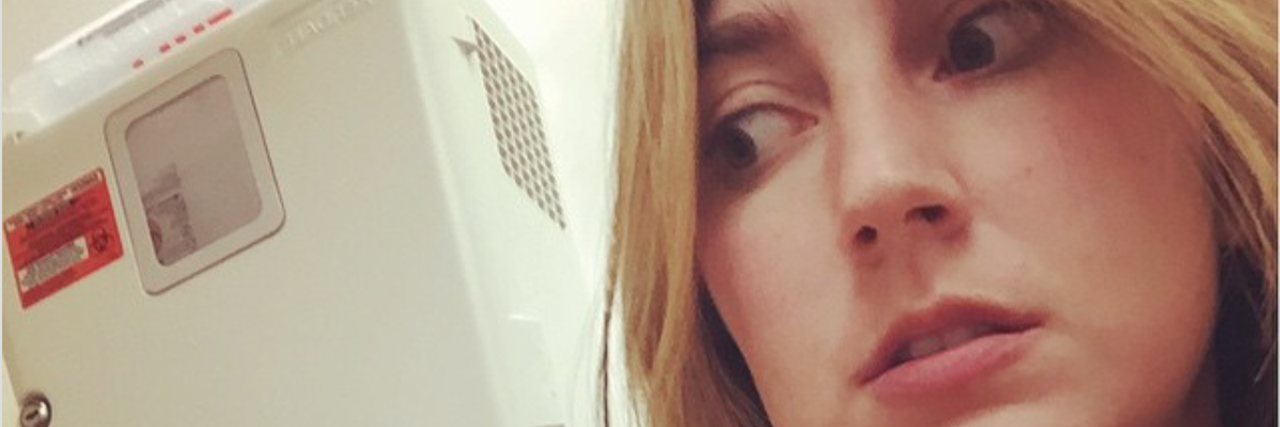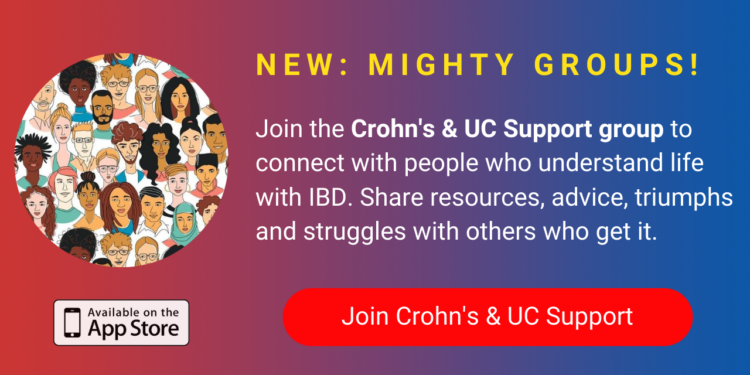Scene 1: In the waiting room of the doctor’s office, early morning, winter 2015
A gaunt 20-something sits with legs crossed, knee bobbing as she circles her foot. Her head darts up from a list of questions. She pauses the pen at her lips, eyes the clock on the wall, and continues scribbling. The clock ticks. A cuticle dangles from her finger.
That’s me, the neurotic character starring in a dramedy. Except lately I was in a psychological thriller. (Think: The Twilight Zone meets ER–or Black Mirror meets Grey’s Anatomy.)
Most of 2015, doctors dismissed my pain as just another flare-up. It took a Saturday full of ER tests to reveal an extensive infection. By night, the colorectal surgeon removed an abscess that put a look of horror on her face during her subsequent apology. This was a scary development in my 20 years with inflammatory bowel disease (IBD). It had always been merely a side character. Now IBD took center stage, looming over every other aspect of my life with a cloud of uncertainty.
Now I was a few weeks into recovery, jotting down questions at the doctor’s office:
Can the abscess come back? Will I develop more complications, like a fistula (hole/channel type thing)? Does this mean I have Crohn’s, not colitis?
I kept the personal questions to myself: How will I keep working, socializing, dating? I was always the strong leading lady of my life–excelling at my duties while maintaining meaningful relationships. This emergency snapped me out of this “thriving 20-something” role. I had been playing the part too well.
Scene 2: In the examining room of the doctor’s office, later that morning, winter 2015
My gastroenterologist (GI) couldn’t answer all my medical questions. Instead, he had a personal one for me:
“Do you want to meet a patient with a similar story–a complicated one?”
I tightened my lips. I’d read horror stories from patients before and always ended up shutting my laptop, choosing to talk with a doctor instead.
But there I was, sitting before my GI, with no answers or way out of this horror show. “Sure,” I said.
Scene 3: Back home in my bedroom, at night, winter 2015
That night, I dialed up my GI’s patient with shaky hands. She answered the phone briskly, like she just awoke from a great night’s rest. She was driving to a night class she teaches on the side.
To say our conversation stunned me would be an understatement. Amid stories of her surgery and fistulizing Crohn’s disease, were delightful anecdotes about her twins and compelling career.
The most gentle wave of relief washed over me. My hands stopped shaking, my eyes pooled with tears. As horrifying as parts of her story had gotten, IBD hadn’t held her back from a fulfilling life. She had gained great wisdom, warmth and humor. After one phone call, I was back to feeling like I could be the heroine of my life again.
Later on Facebook, I’d be reaffirmed by photos of her sweet children and work TV appearances. While I’m the first to know a smile can mask pain, it was apparent she had found joy personally and professionally, despite IBD. She’d occasionally share a selfie at an infusion, or a hospital stay. They’d be accompanied by “Get well soon!” wishes from well-intending commenters who didn’t “get” chronic illness. I did. And even though we remained mostly strangers, there was now this unspoken bond of understanding between spoonies.
***
Present-day, online and everywhere
Season 20 of my chronic illness was a horror, but in five years it returned to a dramedy. There’s been a medical leave, a cross-country move, and a new medical team in NY that’s helped me achieve my longest personal remission.
As Director of Social Impact at The Mighty, I work with media and nonprofit partners to get patient stories to people who can learn from them, or simply relate–feeling less alone and more supported. I work with amazing organizations like Girls With Guts who provide resources to their communities. Every patient needs a full supporting cast of characters. With The Mighty’s launch of our iOS and Android app, people could now post directly to our community. Seeing people get support in realtime has been a highlight of my story.
There is an unparalleled connection when someone shares a raw glimpse of their illness alongside beautiful moments. The spoonie I talked to that night nearly five years ago, coupled with the community members of The Mighty, helped me see how IBD has brought both my life’s greatest sorrows and joys. It’s in this delicate grasp of the good, the bad, and the ugly, that I’ve received true validation in my health journey.
The Mighty community “gets it.” If you have IBD, the new Crohn’s & Ulcerative Colitis Support Group especially will. Your posts won’t be met with “Get well soon,” as if IBD is a head cold. There’s a collective understanding of the unique IBD experience. We will celebrate your bright spots. And whatever spot you’re at in your narrative, we’ll meet you there.
This is the support group I wish I had years ago. It’s never too late–I’m excited for my fellow Mighties to join me here now.
If you’ve reached the end of this story, congratulations–you’ve already turned a page into a bright new chapter of your own.


